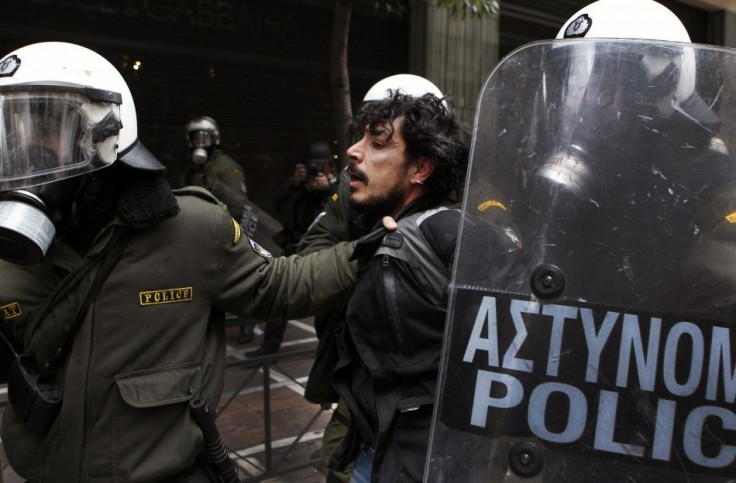Greek Debt Crisis: PM Asks Government to Pass Deal, Warning of 'Recession, Instability, Unemployment and Destitution'

Greece's prime minister struck back at critics in a letter to his Cabinet Friday evening, delivering a rousing plea in which he asked Greek government officials to coalesce behind a new ambitious but achievable program of fiscal austerity; however, the letter acknowledged that would be difficult politically, difficult economically, and socially difficult.
In a letter addressed to coalition partners, Prime Minister Lucas Papademos said it was a historic responsibility for the Cabinet to pass the new austerity measures, negotiated earlier in the week between two of Greece's leading politicians and the finance ministers of other Eurozone countries. The deal is a basic precondition for Greece to receive a €130 billion ($171 billion) bailout.
The overriding need is to do whatever it takes to approve a new economic program and move the new loan agreement, Papademos wrote. Any other outcome would be disastrous.
After days and nights of tense negotiations, Papademos and another leader in his coalition government agreed to a plan Thursday morning that would, among other things, slash the minimum wage, reform the country's pension system, cut discretionary spending by 1.5 percent of the GDP and increase taxes. They took the framework to a meeting of European finance ministers later that day, hoping the sketched proposal would be enough to secure financing for the country, which it needs before March to avoid a sovereign default.
The European ministers declined to accept the plan Friday morning, asking for even more painful cuts and solid assurances from the wider Greek political establishment. Papademos is now seeking to mobilize the rest of the government toward those assurances, even as the country's citizens are demonstrating against the deal with a massive strike and coalition government ministers keep resigning in protest.
In the short term, there will be an impact on economic activity and disposable income, Papademos wrote of the plan. He noted that following the action would eventually release valuable resources for economic development and social protection, create conditions of security and stability, increase confidence in the growth potential of our country and set the economy back on track towards sustainable development.
Dangerous Demagogues
After defending and explaining his actions, Papademos went on a furious attack in his letter about the opportunities he perceived other politicians have left on the table since November, when a national unity government was created to address the crisis.
Three months later, today, we are a stone's throw from ground zero, he wrote
Papademos then goes on to attack those who disagree with the premise of the action.
Some say, bankruptcy might be preferable to an economic program that includes such painful measures. Those who say this are grievously mistaken, or dangerous demagogues.
To complete the changes will take hard work, continuity and consistency, constructive cooperation and unity of social and political forces, the letter says, also adding confidence in ourselves and faith in the need to change our country will be needed.
Indeed, the lack of confidence in the streets of Greece is noted at length in a verbose aside. In it, Papademos said the 11 million citizens of this country are continuously hearing about [political] deadlocks, about depreciation, about pessimism, without seeing a national show of unity to get away from the fatalism.
Recession, Instability, Unemployment and Destitution
The letter concludes with Papademos painting an Armageddon scenario of what would happen if the plan is not accepted. It reads, in part:
A disorderly bankruptcy would throw our country into a disastrous adventure. Circumstances would foster economic chaos and an uncontrollable social explosion. The adverse consequences of a disorderly bankruptcy would be multiple and extremely painful for the Greek economy and society.
The state will be unable to pay salaries, pensions, to cover basic functions -- such as hospitals and schools.
Direct spending cuts, which would have to go in case of a disorderly bankruptcy, would result in real wages and pensions' collapse, especially since it would be even more difficult to tax collection.
Importing basic goods such as medicines, oil, machinery, etc., would be particularly problematic, as the country, both public and private sectors, will lose all access to borrowing and liquidity will shrink. Businesses would close in mass, unable to raise finance.
The living conditions of Greeks in the case of a disorderly bankruptcy would collapse and the country would drift into a long spiral of recession, instability, unemployment and destitution.
In such a situation, for me, there is no dilemma. Patriotism today is not about taking up arms, but united, even with clenched teeth, taking the difficult decisions necessary to save the country.
It is a huge injustice of history, for the country where European civilization began, that in the last 65 years has experienced a civil war and a dictatorship, but then prospered, built on its prosperity, built a democracy, institutions and values, to fall into bankruptcy and find itself, due to a mistake, in national isolation and national despair.
--
© Copyright IBTimes 2024. All rights reserved.











